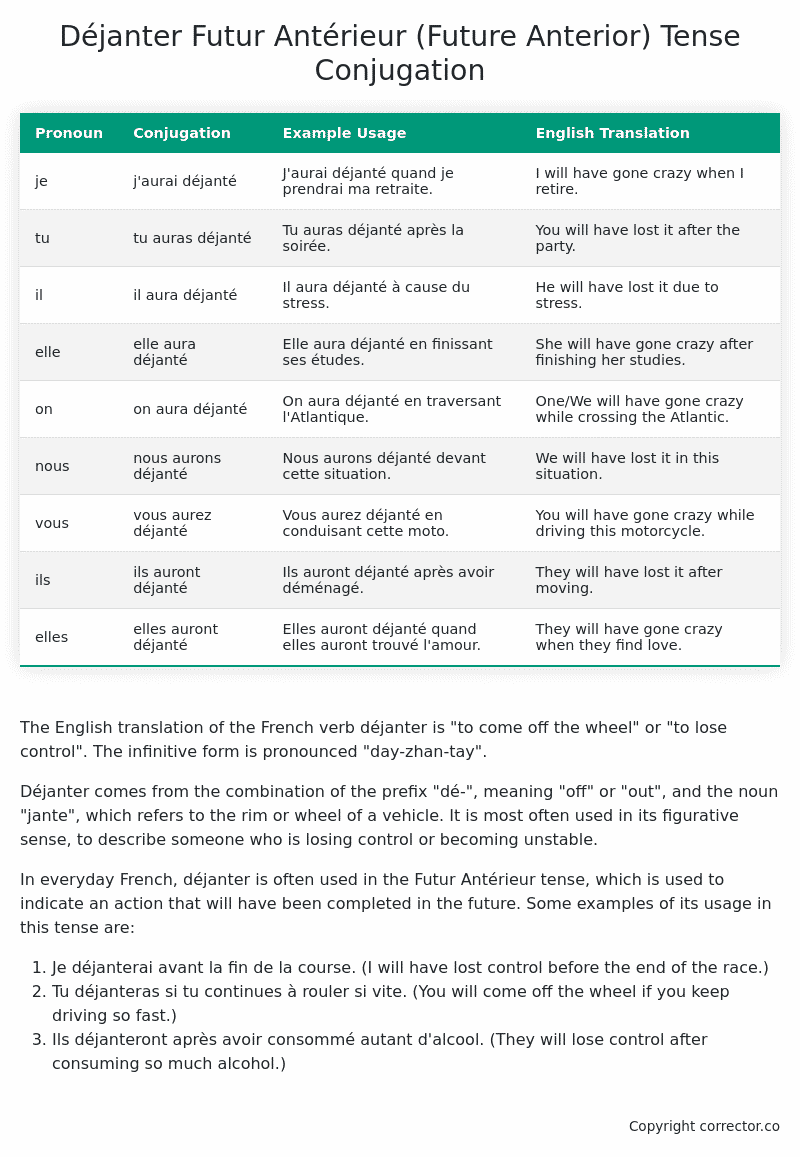Futur Antérieur (Future Anterior) Tense Conjugation of the French Verb déjanter
Introduction to the verb déjanter
The English translation of the French verb déjanter is “to come off the wheel” or “to lose control”. The infinitive form is pronounced “day-zhan-tay”.
Déjanter comes from the combination of the prefix “dé-“, meaning “off” or “out”, and the noun “jante”, which refers to the rim or wheel of a vehicle. It is most often used in its figurative sense, to describe someone who is losing control or becoming unstable.
In everyday French, déjanter is often used in the Futur Antérieur tense, which is used to indicate an action that will have been completed in the future. Some examples of its usage in this tense are:
- Je déjanterai avant la fin de la course. (I will have lost control before the end of the race.)
- Tu déjanteras si tu continues à rouler si vite. (You will come off the wheel if you keep driving so fast.)
- Ils déjanteront après avoir consommé autant d’alcool. (They will lose control after consuming so much alcohol.)
Table of the Futur Antérieur (Future Anterior) Tense Conjugation of déjanter
| Pronoun | Conjugation | Example Usage | English Translation |
|---|---|---|---|
| je | j’aurai déjanté | J’aurai déjanté quand je prendrai ma retraite. | I will have gone crazy when I retire. |
| tu | tu auras déjanté | Tu auras déjanté après la soirée. | You will have lost it after the party. |
| il | il aura déjanté | Il aura déjanté à cause du stress. | He will have lost it due to stress. |
| elle | elle aura déjanté | Elle aura déjanté en finissant ses études. | She will have gone crazy after finishing her studies. |
| on | on aura déjanté | On aura déjanté en traversant l’Atlantique. | One/We will have gone crazy while crossing the Atlantic. |
| nous | nous aurons déjanté | Nous aurons déjanté devant cette situation. | We will have lost it in this situation. |
| vous | vous aurez déjanté | Vous aurez déjanté en conduisant cette moto. | You will have gone crazy while driving this motorcycle. |
| ils | ils auront déjanté | Ils auront déjanté après avoir déménagé. | They will have lost it after moving. |
| elles | elles auront déjanté | Elles auront déjanté quand elles auront trouvé l’amour. | They will have gone crazy when they find love. |
Other Conjugations for Déjanter.
Le Present (Present Tense) Conjugation of the French Verb déjanter
Imparfait (Imperfect) Tense Conjugation of the French Verb déjanter
Passé Simple (Simple Past) Tense Conjugation of the French Verb déjanter
Passé Composé (Present Perfect) Tense Conjugation of the French Verb déjanter
Futur Simple (Simple Future) Tense Conjugation of the French Verb déjanter
Futur Proche (Near Future) Tense Conjugation of the French Verb déjanter
Plus-que-parfait (Pluperfect) Tense Conjugation of the French Verb déjanter
Passé Antérieur (Past Anterior) Tense Conjugation of the French Verb déjanter
Futur Antérieur (Future Anterior) Tense Conjugation of the French Verb déjanter (this article)
Subjonctif Présent (Subjunctive Present) Tense Conjugation of the French Verb déjanter
Subjonctif Passé (Subjunctive Past) Tense Conjugation of the French Verb déjanter
Subjonctif Imparfait (Subjunctive Imperfect) Tense Conjugation of the French Verb déjanter
Subjonctif Plus-que-parfait (Subjunctive Pluperfect) Tense Conjugation of the French Verb déjanter
Conditionnel Présent (Conditional Present) Tense Conjugation of the French Verb déjanter
Conditionnel Passé (Conditional Past) Tense Conjugation of the French Verb déjanter
L’impératif Présent (Imperative Present) Tense Conjugation of the French Verb déjanter
L’infinitif Présent (Infinitive Present) Tense Conjugation of the French Verb déjanter
Struggling with French verbs or the language in general? Why not use our free French Grammar Checker – no registration required!
Get a FREE Download Study Sheet of this Conjugation 🔥
Simply right click the image below, click “save image” and get your free reference for the déjanter Futur Antérieur tense conjugation!

Déjanter – About the French Futur Antérieur (Future Anterior) Tense
Construction
Common Everyday Usage Patterns
Interactions with Other Tenses
For example
Summary
I hope you enjoyed this article on the verb déjanter. Still in a learning mood? Check out another TOTALLY random French verb conjugation!


